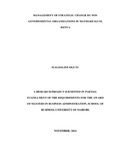| dc.description.abstract | This study sought to establish the forces of change affecting Non
Governmental Organization in Mathare slum of Kenya and to determine strategic
change management practices adopted by Non Governmental Organizations in
Mathare slum of Kenya. This study adopted a descriptive research design. The
population for this study consisted of all NGOs operating in Mathare slum which is 23
NGOs. Both primary and secondary data was used in this research. Primary data was
derived from questionnaires distributed to the NGO managers. The data analysis
included both qualitative techniques and quantitative techniques. The findings show
that most of the respondents indicated that having a crystal clear purpose and a reason
to persevere despite inevitable difficulties, compliance to new regulations and
changing patterns in aid allocations affect their organizations to a very large extent.
These forces were followed by managing business information, consequences of
uncertainty and public better informed about development issues as thought by the
respondents as the forces affect that their organization to a very great extent. The
respondents stated that other forces of change facing their organization were internal
learning of the organization, programs to effectively utilize funds and resources,
creating space for children and introducing life skills, structure and internal
communication. Other forces of change that the respondents stated include: the
environmental uncertainty, continuum of strategic development evolution, whose
characteristics involve preparing functionally based plans, using historical data, no
leveraging of resource and the value system is to meet budgetary targets, resistance by
employees to change and pressure to increase efficiency while delivering improved
and integrated services. In addition to these the respondents stated sustainability of
service even in competitive markets; mitigate against potential failure of privatized
services while reducing transaction costs. The researcher concludes that increased
examination of NGOs will not only allow them to more fully describe the field of
organizational types and their communicative characteristics and dynamics but also
will provide a wealth of opportunities to validate current theoretical assumptions that
have largely been based on the empirical picture presented in corporate organizations.
Although NGOs have become established organizational actors within development
policy and practice, critical questions are increasingly being asked of their
performance and accountability. In general, the roles and activities of NGOs are far
less systematic on internal organizational processes and management.In the light of
this research it is recommended that NGOs have to make strategic choices between
confrontational, complementary or collaborative strategic relationships with
government. The process of making these strategic choices gives rise to internal
tensions concerning expenditure priorities, the conflicting demands of clients and
donors, which result in disagreements over an appropriate balance between quality
services and meeting fundraising targets. Service-deliverers are pulled towards clients
and fund-raisers towards donors. The result can be a split within the organization,
which can be resolved by the voluntary organization acting as a mediator or bridge
between donor and client. | en_US |

